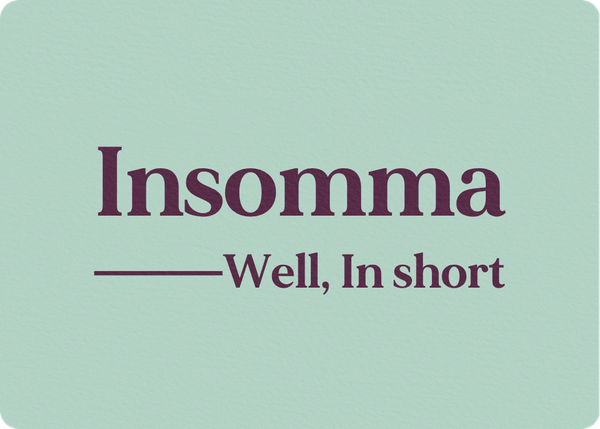Insomma
ADVERB / EXCLAMATION
Meaning and English translation 🔖
1. In short, in conclusion
🇬🇧 Expression used to conclude a reasoning or summarize an explanation.
🇮🇹 Espressione usata per concludere un ragionamento o riassumere un'esposizione.
2. Well, so
🇬🇧 Used to introduce a question or express impatience.
🇮🇹 Usato per introdurre una domanda o esprimere impazienza.
Example sentences 💬
Il film è troppo lungo e ha una trama noiosa. Insomma, non vale la pena di vederlo.
The movie is too long and has a boring plot. In short, it's not worth watching.
Insomma, hai deciso cosa fare per il tuo compleanno?
Well, have you decided what to do for your birthday?
This article is brought to you by Giulia School, where you can learn Italian the natural way—with real conversations and passionate teachers guiding you every step of the journey. It’s the closest thing to immersion you can get without living in Italy. Click here to learn more.
Idioms with insomma 🇮🇹
Insomma...
→ So so
"Come stai?" "Insomma… Ho un po’ di mal di testa."
"How are you?" "So-so... I have a bit of a headache."
Ma insomma!
→ For heaven's sake!
Ma insomma! Quante volte devo dirtelo?
For heaven's sake! How many times do I have to tell you?
Insomma, basta!
→ That's enough!
Insomma, basta con questo rumore! Non riesco a concentrarmi.
That's enough with this noise! I can't concentrate.
Where does the word insomma come from? 🔎
Insomma comes from the Latin phrase in summa, which means "in summary" or "in brief".
Did you know that... 🤓
Impress your italian friends with curious facts about Italy and its culture
Insomma and its brothers: how to express your dissatisfaction like a native
When someone asks you "Come stai?" (How are you?) and you answer "Insomma...", you're saying that things aren't going very well. Here are eight other ways to express dissatisfaction like a native speaker:
1. Nì
This is the shortest one. It's a fusion between "sì" (yes) and "no".
For example: "Ti è piaciuto il film?" "Nì. Gli attori bravissimi, ma mancava la storia."
"Did you like the movie?" "Not really. The actors were great, but the story was lacking."
2. Bah
This expression is a wildcard in the Italian language. It can express uncertainty, indifference, or slight dissatisfaction.
For example: "Allora, cosa ne pensi di questo nuovo ristorante?" "Bah, ho mangiato meglio spendendo meno in altri posti."
"So, what do you think of this new restaurant?" "Meh, I've eaten better for less money in other places."
3. Così così
This is the twin brother of "insomma". It's used exactly the same way.
For example: "Ti senti meglio oggi?" "Così così, sono un po' raffreddata."
"Are you feeling better today?" "So-so, I have a bit of a cold."
4. Si tira a campare
Literally means "one continues to live". It's a somewhat resigned way of saying that one goes on despite difficulties.
For example: "Come va il lavoro?" "Si tira a campare. Ho riunioni fino a tardi e ho poco tempo per studiare italiano."
"How's work?" "We're getting by. I have meetings until late and I have little time to study Italian."
5. Potrebbe andare meglio
This is a common expression to indicate that a situation is not ideal. It's a diplomatic way to express dissatisfaction.
For example: "Come procede il tuo progetto?" "Potrebbe andare meglio. Siamo in ritardo, ma procede."
"How's your project going?" "It could be better. We're behind schedule, but it's moving along."
6. Abbiamo visto giorni migliori
A poetic and diplomatic way to say that things are not going well.
For example: "Come va l'azienda quest'anno?" "Abbiamo visto giorni migliori. Non riusciamo a trovare le persone giuste per la produzione."
"How's the company doing this year?" "We've seen better days. We can't find the right people for production."
7. Bene, ma non benissimo
An honest answer that admits things could be better.
For example: "Come va la dieta?" "Bene, ma non benissimo, ho perso solo un chilo in due mesi..."
"How's the diet going?" "Good, but not great, I've only lost a kilo in two months..."
8. Non c'è male
Indicates a generally positive situation, but not exceptional. It's a way to say things are fine without exaggerating enthusiasm. It's slightly more positive than "insomma" and "così così", and can close the conversation without going into depth.
For example: "Come va?" "Non c'è male, grazie!"
"How's it going?" "Not bad, thanks!"





